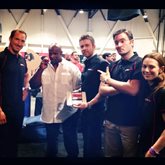Spotlight on... the small business owner
Dr Sam Decombel (BSc Biosciences (Genetics), 2002; PhD Biosciences, 2006) explains how she decided to set up her business, PlayDNA, and what it’s taken to make it as an entrepreneur.
Tell us about your business, PlayDNA.
We provide individuals with completely personalised portraits of their unique genetic characteristics, using the banding patterns of their DNA sample to produce the artwork. We’re the only DNA artwork company that provides DNA portraits with meaning, such as whether you have the gene for speed, or are more of an early bird than a night owl. You could say that the ‘science’ of the art is what sets us apart from the competition.
Why did you decide to set up the business?
I lost my Dad to cancer shortly after I completed my PhD at Birmingham. He’d had so many plans for retirement, but never got to realise them. He told us that we should take our opportunities, so within a few months I left my job, went travelling and started planning my new business.
It was getting onto the University’s BSEEN programme for graduate enterpreneurs in 2010 and that really got things moving. The support I received while on the scheme enabled me to finally set up a laboratory and get PlayDNA off the ground.
Were there any challenges or unexpected situations you faced when setting up PlayDNA during the early days?
The thing that gave us a real headache was money. We didn’t know what was going to come through from month to month, so I took on some part-time work to cover the bills.
It’s true what they say about the ‘Rule of Three’ – everything in your own business takes three times longer and costs three times as much as you expect it to! Even though we tried to plan ahead financially as much as possible, there were still months when we thought: ‘What are we going to do?’
The other aspect that we weren’t prepared for was marketing the business. We continually delayed any publicity while we made sure the product was as perfect as possible, and then discovered what a slow process building up interest can be! We really should have started marketing about 12 months earlier. When we eventually started to get the word out, it had an interesting effect. Although we found people that wanted the artwork, there were many who just wanted the information that the sports portrait provided – such as whether they had the genes for speed, endurance and fat burning – instead.
How has the business evolved?
 On the basis of these enquiries we started to investigate the fitness industry and found that there was a potential market for our work. I was surprised by the size of the industry – the supplements market alone is worth over £22 billion! Serendipitously, we also got chatting with an old friend, Dan Reardon, who was heavily involved in the bodybuilding industry, and had been building a platform providing advice on fitness and nutrition both for pros and enthusiasts.
On the basis of these enquiries we started to investigate the fitness industry and found that there was a potential market for our work. I was surprised by the size of the industry – the supplements market alone is worth over £22 billion! Serendipitously, we also got chatting with an old friend, Dan Reardon, who was heavily involved in the bodybuilding industry, and had been building a platform providing advice on fitness and nutrition both for pros and enthusiasts.
We’ve now jointly set up a new venture, MuscleGenes, to provide the sports profile offering as a gene only test with a more thorough analysis and personalised recommendations based on an individual’s fitness goals.
As Dan had already developed sales channels through his work as a fitness advisor online we had a much more accessible route to market and the immediate success of MuscleGenes has been quite overwhelming! Since launching in July, we have already developed a strong brand presence in the bodybuilding industry in particular. We even got to swab professional bodybuilder and 8-times Mr Olympia Ronnie Coleman! (pictured above)
It certainly looks as if MuscleGenes will be taking the centre stage for us in the immediate future, although none of this could have happened without the platform developed under PlayDNA. We’d love to keep both businesses running alongside one another, especially as we are expecting some quite high profile publicity for PlayDNA early next year!
What advice would you give to anyone thinking of setting up on their own?
Get organised and never underestimate the times things will take. I’ve found that I sometimes have so much to do that I can feel totally overwhelmed and do very little as a result. I now spend an hour each week planning and allocate two important jobs to each day. That way, I may not achieve everything I set out to do, but I know I’m heading in the right direction.